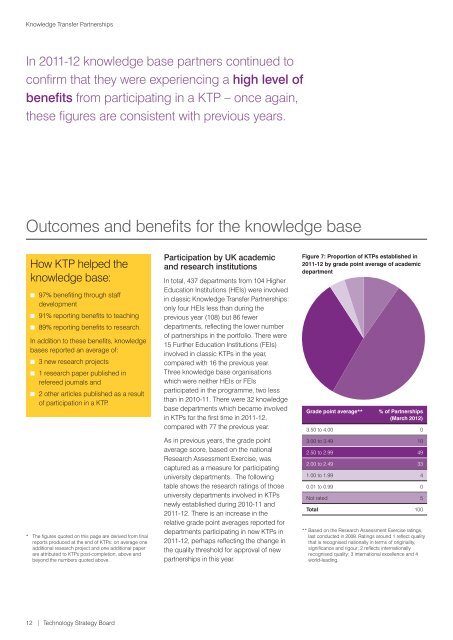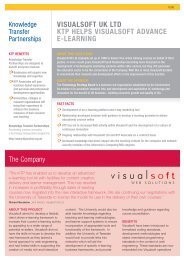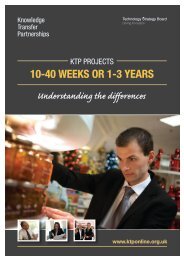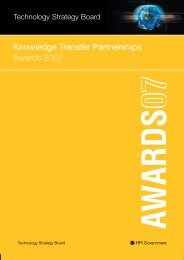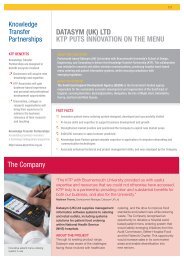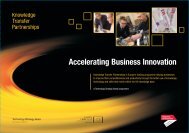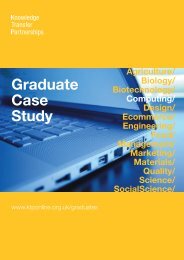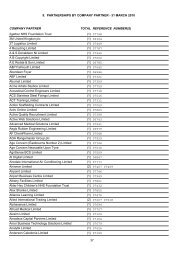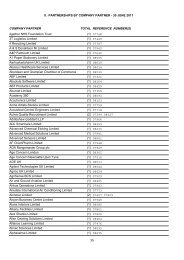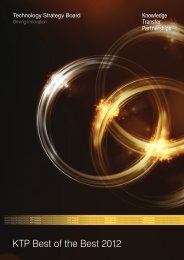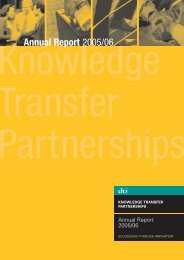Achievements and Outcomes - Knowledge Transfer Partnerships
Achievements and Outcomes - Knowledge Transfer Partnerships
Achievements and Outcomes - Knowledge Transfer Partnerships
Create successful ePaper yourself
Turn your PDF publications into a flip-book with our unique Google optimized e-Paper software.
<strong>Knowledge</strong> <strong>Transfer</strong> <strong>Partnerships</strong><br />
In 2011-12 knowledge base partners continued to<br />
confirm that they were experiencing a high level of<br />
benefits from participating in a KTP – once again,<br />
these figures are consistent with previous years.<br />
<strong>Outcomes</strong> <strong>and</strong> benefits for the knowledge base<br />
How KTP helped the<br />
knowledge base:<br />
97% benefiting through staff<br />
development<br />
91% reporting benefits to teaching<br />
89% reporting benefits to research.<br />
In addition to these benefits, knowledge<br />
bases reported an average of:<br />
3 new research projects<br />
1 research paper published in<br />
refereed journals <strong>and</strong><br />
2 other articles published as a result<br />
of participation in a KTP.<br />
* The figures quoted on this page are derived from final<br />
reports produced at the end of KTPs: on average one<br />
additional research project <strong>and</strong> one additional paper<br />
are attributed to KTPs post-completion, above <strong>and</strong><br />
beyond the numbers quoted above.<br />
Participation by UK academic<br />
<strong>and</strong> research institutions<br />
In total, 437 departments from 104 Higher<br />
Education Institutions (HEIs) were involved<br />
in classic <strong>Knowledge</strong> <strong>Transfer</strong> <strong>Partnerships</strong>:<br />
only four HEIs less than during the<br />
previous year (108) but 86 fewer<br />
departments, reflecting the lower number<br />
of partnerships in the portfolio. There were<br />
15 Further Education Institutions (FEIs)<br />
involved in classic KTPs in the year,<br />
compared with 16 the previous year.<br />
Three knowledge base organisations<br />
which were neither HEIs or FEIs<br />
participated in the programme, two less<br />
than in 2010-11. There were 32 knowledge<br />
base departments which became involved<br />
in KTPs for the first time in 2011-12,<br />
compared with 77 the previous year.<br />
As in previous years, the grade point<br />
average score, based on the national<br />
Research Assessment Exercise, was<br />
captured as a measure for participating<br />
university departments. The following<br />
table shows the research ratings of those<br />
university departments involved in KTPs<br />
newly established during 2010-11 <strong>and</strong><br />
2011-12. There is an increase in the<br />
relative grade point averages reported for<br />
departments participating in new KTPs in<br />
2011-12, perhaps reflecting the change in<br />
the quality threshold for approval of new<br />
partnerships in this year.<br />
Figure 7: Proportion of KTPs established in<br />
2011-12 by grade point average of academic<br />
department<br />
Grade point average**<br />
% of <strong>Partnerships</strong><br />
(March 2012)<br />
3.50 to 4.00 0<br />
3.00 to 3.49 10<br />
2.50 to 2.99 49<br />
2.00 to 2.49 33<br />
1.00 to 1.99 4<br />
0.01 to 0.99 0<br />
Not rated 5<br />
Total 100<br />
** Based on the Research Assessment Exercise ratings,<br />
last conducted in 2008. Ratings around 1 reflect quality<br />
that is recognised nationally in terms of originality,<br />
significance <strong>and</strong> rigour; 2 reflects internationally<br />
recognised quality; 3 international excellence <strong>and</strong> 4<br />
world-leading.<br />
12 | Technology Strategy Board


